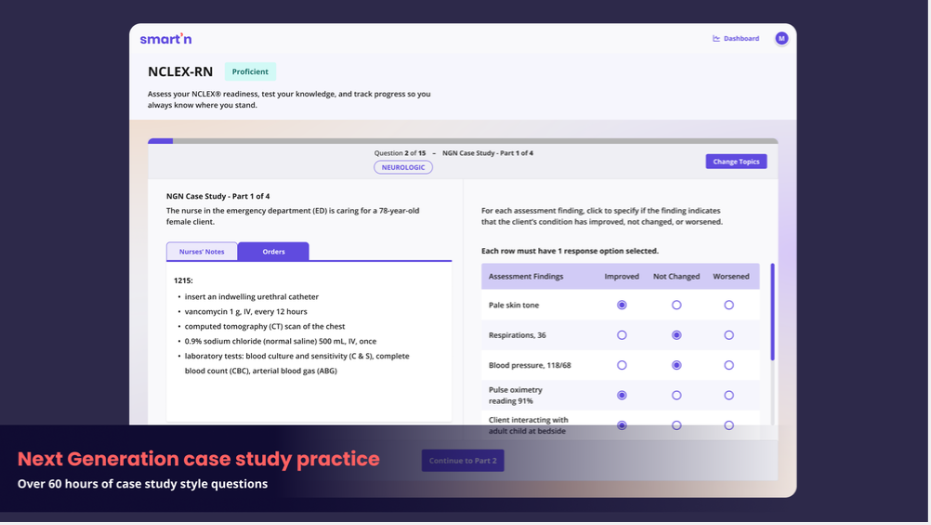NCLEX Nutrition Questions - 2023 Practice Test
In the realm of nursing and healthcare, maintaining current knowledge and skills is of utmost importance. The NCLEX (National Council Licensure Examination) holds significant importance as it evaluates nurses' capabilities, guaranteeing their proficiency in delivering secure and efficient patient care. Among the essential subjects for prospective nurses to excel in, nutrition stands out.
This blog will explore the importance of NCLEX nutrition questions. Furthermore, we will introduce you to Smart'n, a premier platform offering nursing students a valuable resource for NCLEX practice questions.
Significance of NCLEX nutrition questions
Nursing nutrition practice questions hold immense significance in the realm of nursing education and clinical competence. These questions are pivotal in evaluating a nurse's proficiency in understanding nutritional principles, a foundational aspect of effective patient care.
Nutrition is integral to promoting patient well-being, recovery, and disease management, making it imperative for nurses to possess a solid grasp of this domain. The inclusion of nutrition test questions in the NCLEX ensures that nurses can offer appropriate guidance, interventions, and support to individuals across diverse health conditions.
Nursing nutrition practice questions serve as a litmus test for nurses' preparedness to address the nutritional needs of various patient populations. Covering topics such as dietary guidelines, nutritional assessment, therapeutic diets, and the impact of health conditions on nutritional status, these questions assess a nurse's ability to identify nutritional vulnerabilities, create personalized dietary plans, monitor changes in nutritional health, and collaborate effectively within the healthcare team.
Given the rising prevalence of diet-related chronic illnesses and the growing emphasis on preventative healthcare measures, nurses equipped with a robust understanding of nutrition can offer evidence-based nutritional guidance, conduct patient-centered counseling, manage chronic conditions proactively, and mitigate potential complications. In essence, the presence of nutrition nursing practice questions and nutrition test questions in the NCLEX ensures that nursing professionals emerge not only as adept caregivers but also as knowledgeable advocates of holistic patient wellness.
NCLEX nutrition questions
The optimal strategy for getting ready for the NCLEX test revolves around immersing yourself in a multitude of practice questions. At Smart'n, we offer customized quizzes meticulously crafted to assist you in preparing for your nursing licensure examination. By actively engaging with Smart'n's question sets, our sophisticated AI system can identify critical areas and generate quizzes tailored to your needs.
Through this NCLEX study tool, you gain access to a comprehensive collection of over 2,500 practice questions, including NextGen, accompanied by rationales for each.
This resource also enables you to monitor your advancement and thoroughly evaluate your comprehension at every stage.
Here are 5 top NCLEX nutrition questions to help you get ready for your big day:
Question 1:
Which dietary modification is recommended for a patient with type 2 diabetes mellitus?
A) High-carbohydrate diet
B) Low-protein diet
C) Low-fat diet
D) Low-glycemic index diet
Correct answer: D) Low-glycemic index diet
Rationale: A low-glycemic index diet focuses on consuming foods that have a slower impact on blood sugar levels. This is particularly beneficial for individuals with type 2 diabetes to help manage their blood glucose levels more effectively.
Question 2:
What nutritional instruction should the nurse provide to a pregnant woman during her first trimester?
A) Increase sodium intake for fluid balance.
B) Decrease iron intake to prevent constipation.
C) Consume an additional 300 calories per day.
D) Limit calcium intake to prevent excessive fetal growth.
Correct answer: C) Consume an additional 300 calories per day.
Rationale: During the first trimester of pregnancy, an additional 300 calories per day are recommended to support the growing needs of the developing fetus. Adequate calorie intake is important for proper fetal development.
Question 3:
A patient with end-stage kidney disease is on hemodialysis. Which nutrient should the nurse monitor closely in this patient's diet?
A) Sodium
B) Calcium
C) Vitamin C
D) Potassium
Correct answer: D) Potassium
Rationale: Patients undergoing hemodialysis often have impaired kidney function, leading to difficulty in eliminating excess potassium from the body. Monitoring potassium intake is crucial to prevent hyperkalemia, which can lead to serious cardiac complications.
Question 4:
A patient with celiac disease has been advised to follow a gluten-free diet. Which food item should the nurse recommend the patient to avoid?
A) Brown rice
B) Oats
C) Quinoa
D) Wheat bread
Correct answer: D) Wheat bread
Rationale: Wheat contains gluten, which is harmful to individuals with celiac disease. Therefore, wheat-based products like bread should be avoided. Instead, the patient can choose gluten-free grains like brown rice, oats (certified gluten-free), and quinoa.
Question 5:
What dietary modification is recommended for a patient with heart failure?
A) High-sodium diet to prevent fluid loss.
B) Fluid restriction to prevent edema.
C) High-potassium diet to regulate heart rhythm.
D) Low-fluid intake to reduce workload on the heart.
Correct answer: B) Fluid restriction to prevent edema.
Rationale: Patients with heart failure often experience fluid retention and edema. Fluid restriction helps manage these symptoms by reducing the volume overload on the heart and preventing further fluid accumulation.
If you need more nutrition test questions, you can sign up on Smart’n to access more than 2500 practice questions.
Conclusion
In conclusion, the significance of NCLEX nutrition questions cannot be overstated in the world of nursing education and practice. Aspiring nurses and seasoned professionals alike must recognize the pivotal role that nutrition plays in patient care. These questions serve as a bridge between theory and real-world application, assessing a nurse's ability to provide tailored dietary guidance, implement therapeutic diets, and understand the intricacies of nutrition within various health contexts.
FAQs
1- Is nutrition on the NCLEX?
As a nursing student gearing up for the NCLEX examination, you will face assessments that evaluate your capacity to cater to a patient's healthcare requirements rooted in their nutritional necessities.
2- What is the best thing to study for NCLEX?
Engaging in a multitude of practice questions. This helps you familiarize yourself with the format of the exam, improve critical thinking skills, and apply your knowledge to practical scenarios.




